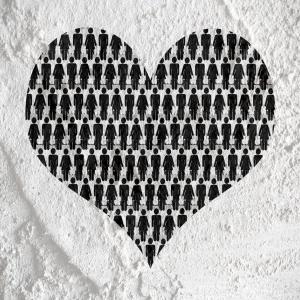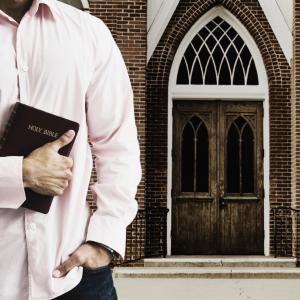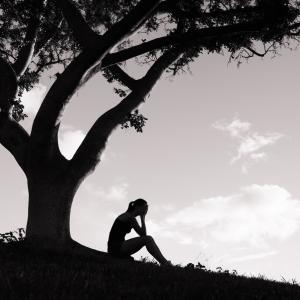
Juliet is a freelance writer and consultant and full-time mom. A transplant from New York City, she has lived in DC for over seven years, but still walks too fast and wears too much black.
Juliet holds a BA in media studies from Queens College (CUNY) and an MPA from the School of International and Public Affairs (SIPA) at Columbia University. She held jobs at the New York Times Syndicate, Redeemer Presbyterian Church, and Sojourners and the ONE Campaign before joining The Clapham Group as an affiliate and going out on her own as a freelancer. You can sometimes find her on Twitter or speed-walking with her son through Navy Yard and Capitol Hill.
Posts By This Author
All the Christian Single Ladies

Image via Rafal Olkis/Shutterstock.com
I am a Christian woman in my mid-30s, and I am single. And though I enjoy a life that I would consider abundant — full of friends and family, great professional opportunities, a decent level of financial freedom, and above all else, an extremely deep spiritual relationship with the Creator of the Universe — I recognize that to many younger women, I’m a cautionary tale. Because I am single.
'All Human Governments Are Intended by God to Do Justice and Mercy'
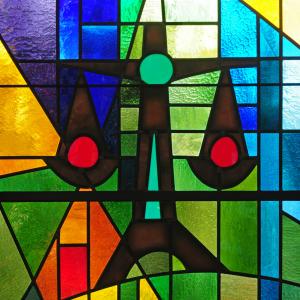
Image via Nancy Bauer/Shutterstock.com
God will himself one day hold all humans, and all human governments, to account, but the church has the responsibility in the present to speak words of truth and judgment in advance of that final holding-to-account. This is where John 16 comes in — the Spirit will hold the world accountable on the issues of sin, righteousness, and judgment. And the way the Spirit will do that is through God’s people following the example of Jesus in John 18 and 19, and speaking the truth to power.
'RISEN' Offers Audience a 'Glimpse of Jesus:' Q&A with Film's Lead Joseph Fiennes
I think the component of introducing a non-believer takes [away] the curse of trying to get it right for everybody, because he’s a non-believer. So let’s see how this works out. But we’re not portraying Christ head-on. We’re coming at them at such an angle that it’s easier to absorb and not be either threatened or challenged or for a lot of people that might not be what it is in Scripture, or their portrayal or their image of Christ or that moment it might not be what the filmmakers have done. … It’s a gentle way in, because you could find him an awful, destructive, murderous Roman soldier. You don’t have to like him; he’s not set up to be liked. … I just think that angle stops it being too head-on for people and then it grows out of that. Just getting a glimpse of Jesus makes us want to get there again and see it again. It’s kind of like in our lives … it’s kind of like faith is strong one day and it’s weak the next.
'RISEN' Interrogates Disciples' Hope, and Ours

Image via IngridHS/Shutterstock.com
Seeing Bartholomew and Mary’s trust in the risen Christ made me want to raise my hands and trust him with all of my hopes. If Christ could master death, what limits could there be to what he could do with them?
Seeing the gracious way in which Jesus shows Thomas his wounds, provides fish for his followers, and restores Peter made me remember all the ways he’s lovingly cared for me. He’s not just a vague myth or a good idea — he’s alive.
All That Remains
I FIRST BEGAN watching The Leftovers, HBO’s drama based on a novel of the same name by Tom Perotta, when it debuted in the summer of 2014. Like many viewers, I was fascinated by the premise: On Oct. 14, 2011, 2 percent of the population suddenly disappears in a rapture-like event. The show begins three years after what is called the “Sudden Departure,” and rather than explaining the metaphysical meaning of this mysterious event, it focuses on how the members of one family process their grief.
Throughout the show’s first season, we’re introduced to an array of characters who deal with the Sudden Departure in different ways. Some want to continue with life as it was on Oct. 13, 2011, before the world changed. Some are tortured by the mystery of the Departure and why they weren’t “taken.” Some seemingly well-adjusted people join the cults that have sprung up since the event. One group in particular has gained the most traction, the Guilty Remnant. The group exists to be “living reminders” of God’s judgment; they make it their mission to make people remember, but offer no comfort. Another cult features a messianic leader who promises to absorb the pain of anyone who hugs him, but offers no spiritual or intellectual balm for the hurt and confusion post-Departure.
The novel on which the show is based was written as a response to the way the world changed after Sept. 11, so it was particularly poignant that the attacks in Paris occurred as I watched the second season of The Leftovers. Certainly it’s grievous to see violence occur anywhere, but as with Sept. 11, the attack on Paris brought with it a shocking cognitive dissonance: That kind of thing doesn’t happen in places like this—Western, cosmopolitan, relatively safe. Before the attack in Paris, before the Twin Towers fell, there was always the possibility that something tragic could occur on a random Friday night or Tuesday morning. But perhaps to many of us who live in relative comfort and ease, violence and tragedy are what happens to other people, in other places. It is this cognitive dissonance and the subsequent question of how to live in uncertain times that the second season of The Leftovers explores. It is also what makes it worth watching.
What Is an American?
January 1 marked the 124th anniversary of the opening of Ellis Island. Years later, in 1916, the immigrant inspection station was opened. Over the course of 60 years, more than 12 million immigrants came through the island.
Almost all of my great-grandparents were among that number, although, according to a sister who has been researching our history on ancestry.com, we can’t find any records. A fire destroyed the original station in 1897. It’s likely that our family’s records went up in flames with so many others’. Although — like many New Yorkers — I’ve never been there (who really has the time to schlep over there except tourists or class trips?), the island looms large in our collective self-understanding. Yes, we are Americans, but for us “American” meant “immigrant.”
Harry Potter and the Advent Devotional
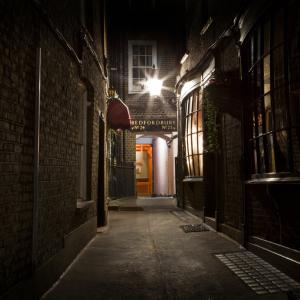
Image via chrisdorney/Shutterstock.com
But perhaps the reason why the darkness cannot understand or overcome the Light is because it will not and cannot imagine reducing itself or condescend to be like its enemy in order to overcome it. Scripture describes an adversary who wanted to be like God, but doesn’t seem to understand that God’s very nature is “gentle and humble and heart.” The nature of darkness is not a generous one. It doesn’t offer light or heat or allow other things to grow. It isolates.
What Are We Waiting For?

Image via Charts and BG/Shutterstock.com
I wonder if God calls us to celebrate waiting because the lie we’re all most susceptible to is that if we just get what we want, we’ll be ok. When this is our mentality, we actually forget to live. We become so future-oriented that we can ignore the presence of God in our midst and the signs of the Divine work in this world. We can miss out on the good things he provides daily, hourly.
To Whom Does God Offer Refuge?

Holy Eucharist, Thoom / Shutterstock.com
I’ve thought about this obedience to vulnerability in light of the current conversation our nation has been having about the refugee crisis, in particular since the attacks in Paris this weekend. The fearful calls to close our border have been disheartening, especially as we begin to enter the season of Advent. Jesus, as God incarnate, saw our sin and flaws and darkness — our hostility even — to the Light and still made himself vulnerable to live among us and die at our hand. Through the cross he offered a generous hospitality to us while we were still enemies of God — a feast of himself, for us to taste and see that God is good.
It should not be any different for us as followers of Christ. As any Christian knows, being part of the Body of Christ is often a dangerous proposition. We are in danger of getting hurt any time we come into contact with another person. We will sin against each other, we will experience conflict, and if we’re doing it right, we’ll bear each other’s suffering. We are knit together with people we may not typically associate, people who view the world in ways we may find misguided at best and dangerous at worst. It doesn’t matter — we’re still invited to the same feast and we’re still joined together in the same family, drinking out of the same cup the way family members and close friends do.
'Room' Shows Us Our Own Stories
There’s a beautiful moment in Lenny Abrahamson’s Room (now in limited release) in which the character Ma explains the reality of their situation to her bewildered son. Contrary to what she had taught up until that point — that they were the only people in the entire realm of existence, which was limited to the room in question — she explains that they are actually held hostage in a small garden shed in their captor’s backyard. Sensing that Old Nick, her kidnapper and Jack’s father, might kill them because he will lose his house, Ma enlists her son’s help in an escape plan.
In shock and denial he says, “I want another story.”
Ma replies, “This is the story you’ve got.”
When God Is Like an Italian Grandmother
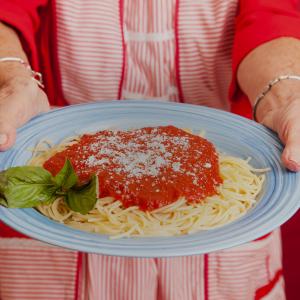
Image via Lisa F. Young / Shutterstock
I still recall that moment when I first heard the words of the liturgy:
“The gifts of God for the people of God. Take them in remembrance that Christ died for you, and feed on him in your hearts by faith, with thanksgiving.”
I had never considered the Lord’s Supper as feeding on Christ. Growing up in a charismatic, non-denominational church and then embracing my faith as an adult at a Presbyterian church, I found this to be a foreign (and admittedly strange) concept that didn’t fully take root in me until after I began attending an Anglican church on Capitol Hill.
As I grappled with unemployment those first months in D.C., feeding on Christ in my heart by faith became more real to me: I didn’t have a seat at the proverbial table, but here was a table prepared for me, full of all the goodness and joy and love and peace and grace I could imagine, because it was Christ who was on offer.
Celebrating the Vote
I've done it in booths at a New York City public school, and the 92nd Street Y. I've done it on a small, enclosed counter in DC. But you never forget the first time you voted.
My first time at the polls was not particularly spectacular — it was an off-year for elections, so I voted on a referendum. Since then I have voted every year except twice. Once was on another off-year — I was in grad school for public administration and had to finish a statistics assignment. And for the other, I’d just become a DC resident, too late to vote in the special election that year.
In case it’s not obvious, voting is important to me, and I’m kind of a dork about it. And when I consider the hard fight for women’s suffrage, I feel that the best way to honor the women who fought hard for that right is to responsibly exercise it.
So it’s disheartening to hear women say that they don’t really pay attention to politics or take the time to vote. And as a DC resident whose interests are determined by the legislators of other states, it’s hard to watch anyone take for granted their right to vote.
In Defense of Marriage
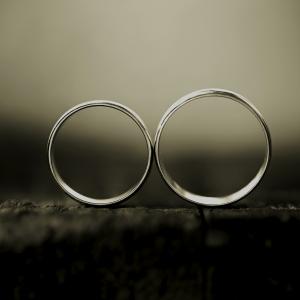
Image via isak55/Shutterstock
A few weeks ago, the single person’s lament was eloquently stated in The New York Times opinion pages, with a piece called "The Supreme Court’s Lonely Hearts’ Club" by Michael Cobb. Cobb articulated some of the pause that many of us singles have felt as the conversation has gone on about marriage, in particular how Justice Kennedy captured the spirit of the age by extolling the matrimony as the highest institution in the land.
I don’t disagree about the importance of marriage, but I have a lot of concern about how it has been talked about and in many ways idolized in this country. Much of the church has led the way on this idolatry — on the policy end, claiming the need to defend marriage; on the spiritual side, treating marriage as a pseudo-salvation, as though being married means that in some way you’ve "arrived" spiritually.
A few weeks ago, the single person’s lament was eloquently stated in The New York Times opinion pages, with a piece called "The Supreme Court’s Lonely Hearts’ Club" by Michael Cobb. Cobb articulated some of the pause that many of us singles have felt as the conversation has gone on about marriage, in particular how Justice Kennedy captured the spirit of the age by extolling the matrimony as the highest institution in the land.
I don’t disagree about the importance of marriage, but I have a lot of concern about how it has been talked about and in many ways idolized in this country. Much of the church has led the way on this idolatry — on the policy end, claiming the need to defend marriage; on the spiritual side, treating marriage as a pseudo-salvation, as though being married means that in some way you’ve "arrived" spiritually.
A few weeks ago, the single person’s lament was eloquently stated in The New York Times opinion pages, with a piece called "The Supreme Court’s Lonely Hearts’ Club" by Michael Cobb. Cobb articulated some of the pause that many of us singles have felt as the conversation has gone on about marriage, in particular how Justice Kennedy captured the spirit of the age by extolling the matrimony as the highest institution in the land.
I don’t disagree about the importance of marriage, but I have a lot of concern about how it has been talked about and in many ways idolized in this country. Much of the church has led the way on this idolatry — on the policy end, claiming the need to defend marriage; on the spiritual side, treating marriage as a pseudo-salvation, as though being married means that in some way you’ve "arrived" spiritually.
Redefining Family
This extravagant love poured out on my behalf felt like an offer of grace from God, a reminder that though the man I had dated couldn’t love me as I should be loved, God would make up for the rest. It was a convicting moment — I have often viewed this type of love and friendship as a consolation prize for not having a significant other. What a small way to live and love when you only expect love from spouse and children and see the love of friends and family as lesser. How could such a small group of people really show all the wonder and magnitude of God’s unfailing love toward us?
'Did God Kill Jesus?' Author Talks Suffering, Reconciliation, and the Cross
It was the means of agonizing humiliation and execution and has adorned the banners of armies through which some of the most brutal violence was perpetrated in history. It is a symbol worn by the faithful and sometimes the fashionable. It has famously been described as a stumbling block and foolishness. The cross is central to the Christian faith — but what does it mean? And how could this symbol of weakness also be a source of strength for followers of Christ?
As Christians ponder the mystery and meaning of the cross and Christ’s resurrection in this Easter season, I read Tony Jones’ new book, Did God Kill Jesus? which explores and analyzes various atonement theories through history and culture and considers whether the most famous — penal substitutionary atonement — is really the most accurate. Although Tony and I do not necessarily share the same views, I realized that our perspectives are not as far off as I had thought. I recently had the opportunity to interview him about the book and how his study and meditation of the cross has shaped his understanding of the crucifixion and what that can mean for the faithful.
(This interview has been edited for length and clarity.)
JV: You touch a bit on this in the book (but for those who might not read it), what do you believe are the theological and social implications of holding to a belief in penal substitutionary atonement? Could you elaborate on what you think those implications are? And do you think there can be anything redemptive or beautiful in Christians holding to a substitutionary atonement theory of the crucifixion?
'No, Jesus Isn't My Boyfriend' and Other Lessons from Single Christians on Valentine's Day
So it’s almost Valentine’s Day. Seemingly everywhere you look is a celebration of love and romance. There’s so much sweetness in the air (and on store shelves), it has almost the opposite effect.
Especially if you’re single. Valentine’s Day is often one of the most uncomfortable days of the year. It’s that one special day a year in which single people are painfully reminded that we may very well die alone and childless. Unfortunately, in our romance and sex-saturated culture, every day kind of reminds you of that.
The church hasn’t offered much by way of alternatives. In the evangelical church, there’s far too much “Jesus is my boyfriend” or “I’m dating Jesus”-type songs and teaching that it trivializes the kind of intimacy that can exist between God and humanity. And it silences the deeper pain of loneliness and disappointment that single adults — both gay and straight — can feel. Humans were made for relationship with God, but we were also made for relationships with each other.
There are a couple of issues at work here. On one hand, we’re fed so much junk about sex and romance and relationships from our culture that it becomes difficult to think any differently about love. When the highest, most celebrated form of love in our culture is erotic love and romance, the concept of spiritual intimacy with God seems unsatisfying and — let’s be real — also kind of icky. It feels like a consolation prize, something you say to make yourself feel better about being alone.
On the other hand, in the church, marriage almost becomes an idol. Christina Cleveland writes all kinds of amazing things about singleness in this essay, (so many I want to quote!) but this stands out:
“After interacting with the church, many singles start to wonder: Is there something wrong with me? Is God working in my life? Am I as valuable (to God, to the church) as married people? Does God love me as much as he loves married people? Does God have good things in store for me as a single person?”
Confessions of a Church Snob
Being “right” is exhausting.
You know what I mean. A controversy blows up over social media and the faith must be defended. A conversation about church practices becomes a nitpicky theological debate. A news story catches our eye and we are filled with outrage and take to our laptops to be the first to comment.
I feel as though I live in a world in which I’m constantly tempted — and encouraged — to major in details and minutiae and miss the very real and beautiful and incomprehensible presence of God.
Which is why being “right” is exhausting.
I thought of this the other day while visiting a different church from the one in which I am a member. My first — and wrong — reaction was to tense up. It seemed that everything about church that I had tried to escape was on display. I’ve learned to pay attention to those reactions. I have found that whenever something bothers me and makes me speak in absolutes, it’s because there’s a part of my heart I want to hoard for myself instead of allowing God’s light to shine on it. I hate to admit it, but so much of my identity as a Christian is defined by what I’m not.
Enjoy the Silence
Like many of my peers that weekend, I went into the retreat with some trepidation. Silence for 20 hours? What would we do? I had experienced long periods of informal silence during my 19 months of unemployment and had experienced the richness of God’s presence during that time. But that was different — I could escape the silence any time I went to a yoga class or turned on Spotify. Twenty hours of silence felt daunting.
Even more daunting? Twenty hours alone with just me and God. Sure, God had shown up and been with me during those long months of being alone, but this was different. Would I do it wrong? More importantly, what would happen? What would it be like to be alone with God without any distraction for that length of time?
Well, it felt like gazing into someone’s eyes for hours and hours and not having anything to pull you away. Which is exactly why, after that experience, I now actively seek out opportunities for silence.
Nothing Religious About It
SINCE WAR BROKE out in the Central African Republic in March 2013, the international community has referred to it as a “religious conflict.” When the media cover the violence at all, they usually frame it as a story of Muslims against Christians. However, to call this conflict a war of religion is simplistic at best and a smokescreen for the real causes at worst.
That is the message that Central African Republic (CAR) faith leaders—Catholic, evangelical, and Muslim—have worked tirelessly to spread, at great personal cost. Imam Omar Kobine Layama, president of the Central African Islamic Community, Catholic Archbishop Dieudonné Nzapalainga of Bangui, and Rev. Nicolas Guérékoyame-Gbangou, president of the Evangelical Alliance of the Central African Republic, have been at the forefront of their country’s peace and reconciliation movement.
During a November 2014 interview in Washington, D.C., Archbishop Nzapalainga adamantly refuted the “religious war” narrative.
“Our role is to continually remind our religious believers ... that those people who want to kill people or rape people ... are in contradiction with their faith,” he told Sojourners. “We, for example, have never been telling our believers that they should go out and kill Muslims, and the imam has never been telling his followers that they should go out and kill Christians.”
The Gift of Hopelessness
This Advent I am grateful for the gift of hopelessness. Yes, you read that correctly. This past year has been full of heartbreak, suffering, and lament. It follows on the heels of nearly two years of unemployment, financial insecurity, and stress-related health issues. Any hope to which I once clung — any hope outside of God, that is — has been destroyed.
And for that I give thanks.
This summer, as I waited anxiously to hear what was strangely afflicting my father (who had already had several health scares and a heart attack), as I nursed a broken heart and came to grips with personal disappointment, as I watched how a once rosy-outlook turned to a heavy-grey, I learned the true meaning of hope. Everything in this world will break or decay or simply fade away. Nothing here is permanent and even the most seemingly perfect and ideal situation has at least a hairline crack.





